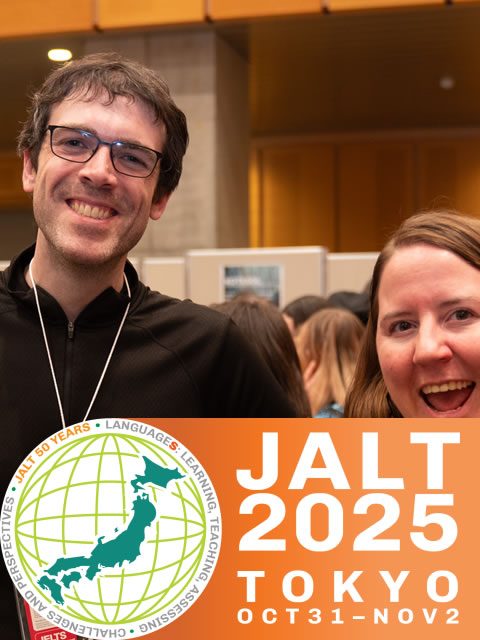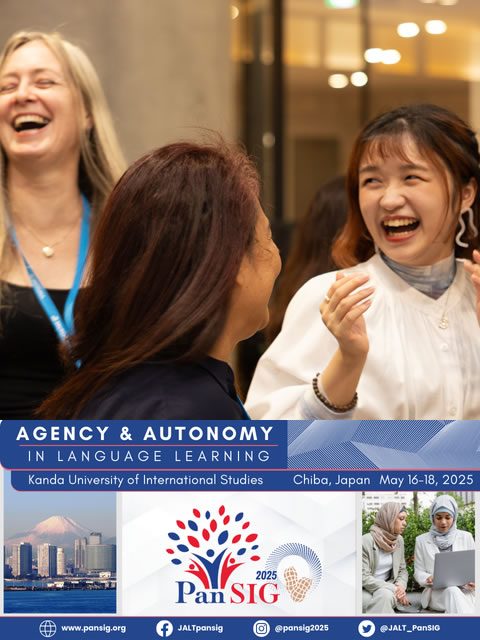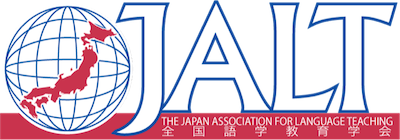Your cart is currently empty!
Technology in Teaching (TnT) Workshops
•
Digital technology for teaching and learning
As technology plays an increasingly important role in language education, teachers face the challenge of selecting appropriate technologies and learning how to use them. The aim of the JALT pre-conference Technology in Teaching (TnT) workshops is to help teachers navigate their way through the bewildering array of technologies available, select technologies which are appropriate for their teaching context, and learn how to effectively make use of the technology in the classroom. The TnT presenters, all experts in technology, will offer guidance on using technology and provide ideas on how to best integrate technology with language teaching practices. This year, TnT will include workshops on some of the latest ideas in educational technology, including augmented reality, Google+, and the use of iPads, as well as practical sessions on more established applications, such as Moodle, Microsoft Word and Microsoft Excel. Participants are encouraged to bring along a Wi-Fi enabled device to participate fully in sessions. TnT workshops are scheduled for Friday 21st Nov. We recommend you pre-register online.
1st Session (13:30 – 15:00)
Naeko Naganuma:“Basics of Word and Excel for Language Teachers”
Daniel Beck: “iPads in the Classroom, Basic and Intermediate”
Rab Paterson: “PLN & Community Building with Google+”
2nd Session (15:30 – 17:00)
Samantha Kawakami: “Basic Moodle for True Beginners”
Paul Daniels: “Mobile Learning in the EFL Classroom”
Tamara Swenson & David Bramley: “Creating Interactive ebooks: All about Widgets”
3rd Session (17:30 – 19:00)
Malcolm Swanson: “Layout Software for Materials Creation”
Thomas E. Bieri: “Making your own WebQuests”
Eric Hawkinson: “Augmented Reality Enhanced Materials Design”
Naeko Naganuma
Basics of Word and Excel for Language Teachers
This workshop will demonstrate practical skills in Microsoft Word and Excel for language teachers. Many teachers use Word for making classroom handouts and other informational documents for their classes, but they find it disappointing when they cannot format a document as they wish. Other times, they might feel frustrated when they cannot use functions in Word satisfactorily. Some teachers do not use Excel because it is “scary” to start with it. To make full use of the programs, participants will learn how to set the default settings, how to insert tables and images, and how to use the ‘Review’ features in Word. The workshops will also provide basics of Excel so that participants can utilize the program to calculate final grades and manage student data more easily.
Naeko Naganuma has been teaching EAP classes for ten years as an assistant professor at Akita International University. Her research interests lie in the fields of CALL, intercultural skills development, and applied linguistics, especially pragmatics.
Daniel Beck
iPads in the Classroom, Basic and Intermediate
iPads continue to grow in popularity with teachers and students. This workshop will demonstrate basic uses and apps to use with students or to manage classes. In addition, more advanced techniques such as wireless mirroring with an AppleTV and newer apps will be introduced. While this workshop is suitable for beginners, new techniques will be added from previous workshops. Participants will be encouraged to ask questions and share examples of how they have used mobile devices in the classroom.
Daniel Beck is an instructor at Toyo Gakuen University and has been an active proponent of Apple hardware and software in and out of the classroom. He blogs about this topic at http://iostesol.blogspot.com/ and tweets at http://twitter.com/gtb (@gtb).
Rab Paterson
PLN & Community Building with Google+
Personal Learning Networks & Community Building with Google+ PLNs arrived with the emergence of the Internet via linked blogs, Google Groups, and Nings. They evolved with RSS and Twitter feeds, and professional focused services such as LinkedIn. Now Google+ Communities is at the peak of SNS tools in terms of power and convenience. This workshop session shows the power and range of Google Apps and Google+ Communities for creating virtual PLNs for teachers and students. Google+ Communities offer many benefits over other SNSs in terms of PLN creation and usage, and this workshop will show how to leverage their many benefits by showing existing Google+ Communities and how well they integrate with Google Apps and beyond. Attendees should have a Gmail account and have signed up for Google+ before the workshop as we will create and use a PLN using Google+ Communities and use mostly Google Apps during the session.
Rab Paterson is President, Conference Chair, and Webmaster of the Asia Association for Global Studies, a Fellow of the British Royal Asiatic Society, Social Media Officer for Tokyo JALT, and holds memberships in many ed-tech organisations. He has been teaching at Japanese universities since 2001, is currently a doctoral candidate on the International EdD at the IOE in London, is on the COETAIL program at SUNY (Buffalo), and is an Apple Distinguished Educator and Google Certified Teacher.
Samantha Kawakami
Basic Moodle for True Beginners
This workshop is for teachers interested in Moodle who don’t know where to start. Moodle can be a wonderful tool for extended interaction among students and teachers, but the initial setup can be overwhelming, and often not setting something up in a certain way at the beginning leads to problems later which are time-consuming to correct. This workshop will focus on basic site and course setup: selecting a template, setting up a course, modifying the layout using blocks, adding users, using the grade book for offline assignments, using the rubric function, and adding plugins. Basic setup options and the reasoning behind them will be explained so that teachers can confidently choose the correct settings and save themselves hours of frustration later! This workshop will not be demonstrating a lot of cool plugins, but really just focusing on the basics for beginners.
Samantha Kawakami’s past experiences include teaching English for a large eikaiwa and working for Macmillan. Now Sam lives in Izumo, Shimane-ken, where she has her own school, teaches at Shimane University, works for APRICOT Publishing, and organizes a teachers’ group. She is also a tech geek, who enjoys sharing ideas.
Paul Daniels
Mobile Learning in the EFL Classroom
In this hands-on workshop, the presenter will demonstrate a number of mobile learning activities that can be used to augment the EFL classroom. Participants will have a chance to try out several of the apps and activities that illustrate how mobile devices, such as tablets and iPods, can be used to create motivating, engaging and student-centered learning tasks. Futaba classroom games, Quizer, Quizlet, Explain Everything, Doceri, Quickoffice, AirServer and Mobile Course Manager are just a few of apps that
will be introduced in this session. The presenter will also offer practical advice on mobile content management, device and app administration, and app development.
Paul Daniels is a professor at Kochi University of Technology. His research involves CALL, ESP and project based-instruction. He also develops Moodle plug-ins and mobile apps for language learning.
Tamara Swenson and David Bramley
Creating Interactive ebooks: All about Widgets
The digital age demands digital materials. But creating these is more than cut and paste. Whether you want to write a book or simply make a lesson, this workshop will demonstrate the tools to create interactive eBooks. Using iBooks Author software (for Apple computers), the presenters will demonstrate the features they have used to create content-based eBooks (10 to date, with more in production) which take advantage of English language learners’ comfort with technology.
Tamara Swenson (Ph. D., Communication, UC-Boulder) has been teaching in Japan for 30+ years, 22 at Osaka Jogakuin University. In addition to research in EFL learning (writing, vocabulary, testing) and mass communication (media framing, media use), Tamara has led OJU’s content-based materials development team as it moved from paper-based texts to interactive eBooks for iPads.
David Bramley (M.A., TEFL, U. of Birmingham) has been teaching at Japanese universities since 1990. He has written more than 20 texts for TOEIC practice as well as several course textbooks. As an associate professor at Osaka Jogakuin University, David has been heavily involved in the writing and editing of OJU’s content-based eBooks.
Malcolm Swanson
Layout Software for Efficient Materials Creation
Teachers spend countless hours creating class materials, often struggling with the idiosyncrasies of software such as Microsoft Word in the process. In this workshop, we will look at the advantages of using dedicated layout software—in this case, Adobe InDesign—to not only streamline the task, but also improve overall design. We will begin with a basic overview of the interface, and then look at using the templating and styles features to increase productivity. We will also discuss the use of keyboard shortcuts, file formats, and data merging. This workshop will be of particular use to InDesign novices.
Malcolm Swanson teaches English and media studies at Seinan Jo Gakuin University in Kitakyushu. He is also responsible for much of the layout of JALT’s publications.
Thomas E. Bieri
Making Your Own WebQuests
This workshop will help attendees with developing WebQuests for their own teaching context. WebQuests are a way we can engage learners in scaffolded practice both using digital resources and engaging in disciplined inquiry. The presenter will define WebQuests, and show examples including ones freely available for use. Then participants will be guided through a hands-on design and building process using free on-line resources. Participants should leave with a better understanding of WebQuests and with knowledge and skills allowing them to easily create and share their own. Participants should be comfortable searching the Internet but do not need specialist technology skills.
Thomas E. Bieri is currently an instructor at Nanzan University. He has over 25 years’ experience working in higher education, including positions in technical services and teaching. His instructional and research interests include educational technology and extensive reading.
Eric Hawkinson
Augmented Reality Enhanced Materials Design
This is the year of wearables, as smart tech is starting to go not just in our pockets but around our wrists, in our clothes and in front of our eyes. These devices are augmenting our reality like never before. In this workshop we look at emerging technologies using augmented reality and its use in language learning. Participants will have a chance to test some of these technologies as the workshop progresses using their own mobile devices. Materials created by the presenter will also be available for demo. Participants will also have the opportunity to create simple augmented reality enhanced materials using their own smartphone or tablet. BYOD – Please bring an Android or iOS mobile device to participate in the creation of materials. A preview of the types of activities you can create with AR is available on the presenter’s website: http://erichawkinson.com/ar
Eric Hawkinson was born in Wisconsin and raised in the deserts of Arizona. Having a professional background in IT Eric is taking everything ‘techie’ and turning it towards educating students. He now works and lives in northern Kyoto prefecture, Japan, currently focusing on games-based learning, electronic informal learning environments and eTourism. More info: http://erichawkinson.com

JALT2025 International Conference
2025年10月31日(金)〜2025年11月02日(日) 東京都渋谷 国立オリンピック記念青少年総合センター Friday, October 31 – Sunday, November 02, 2025 • National Olympics Youth Memorial Center, Tokyo, Japan

PanSIG Conference
PanSIG 2025 will be held May 16-18 in Chiba. PanSIG is an annual conference organized by JALT’s Special Interest Groups (SIGs).
